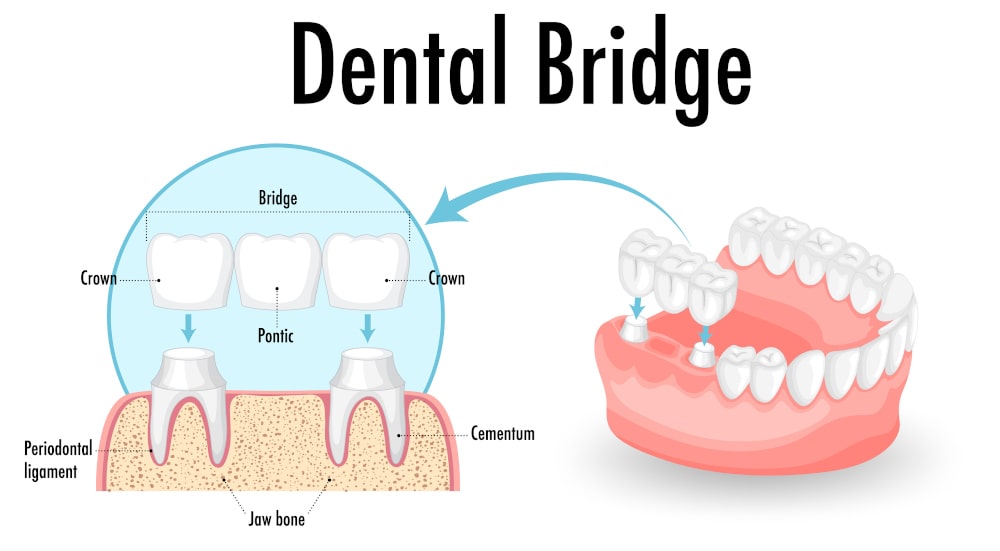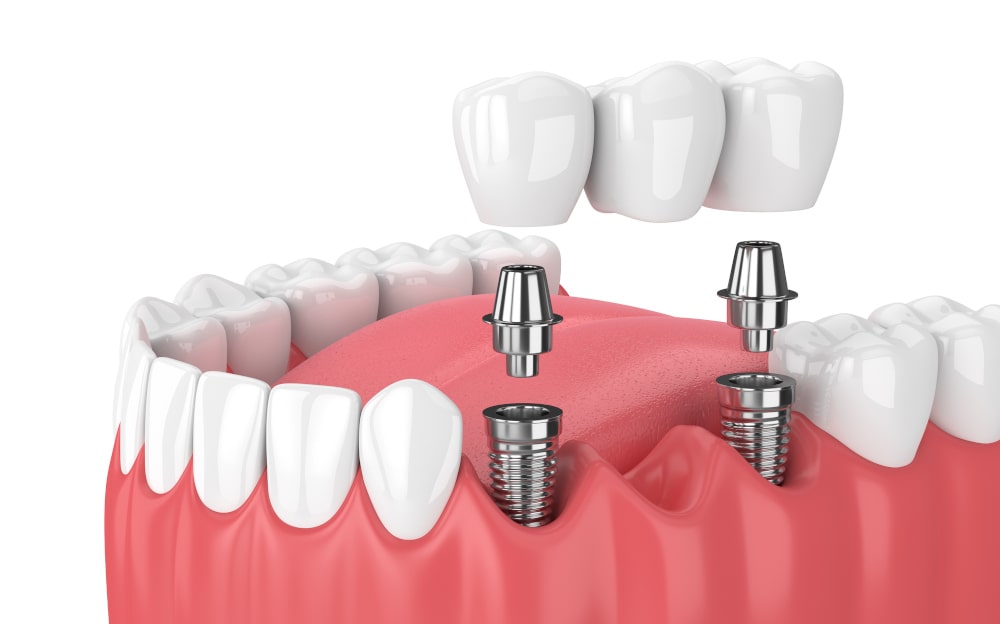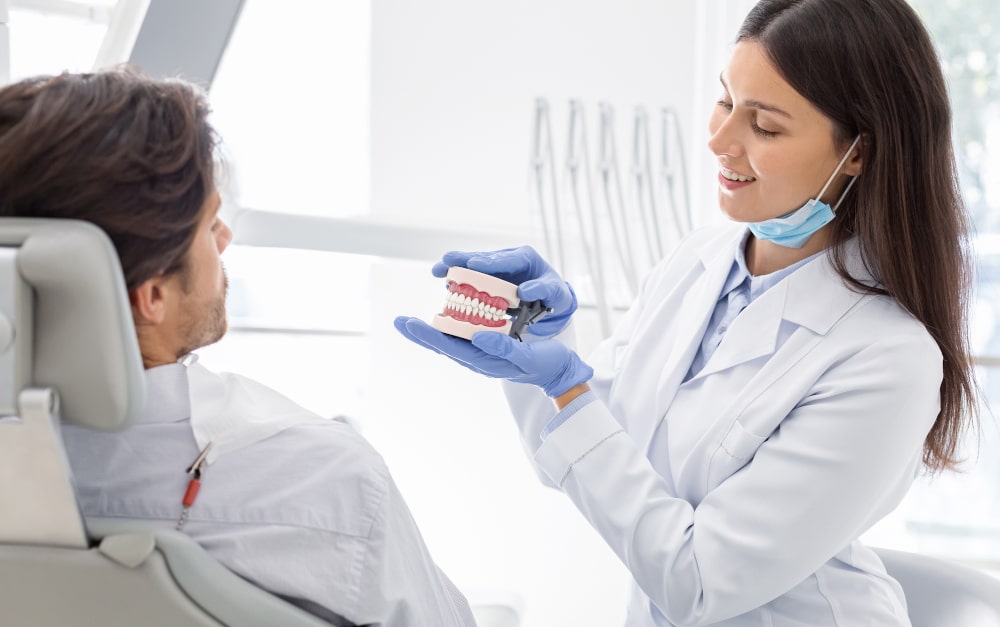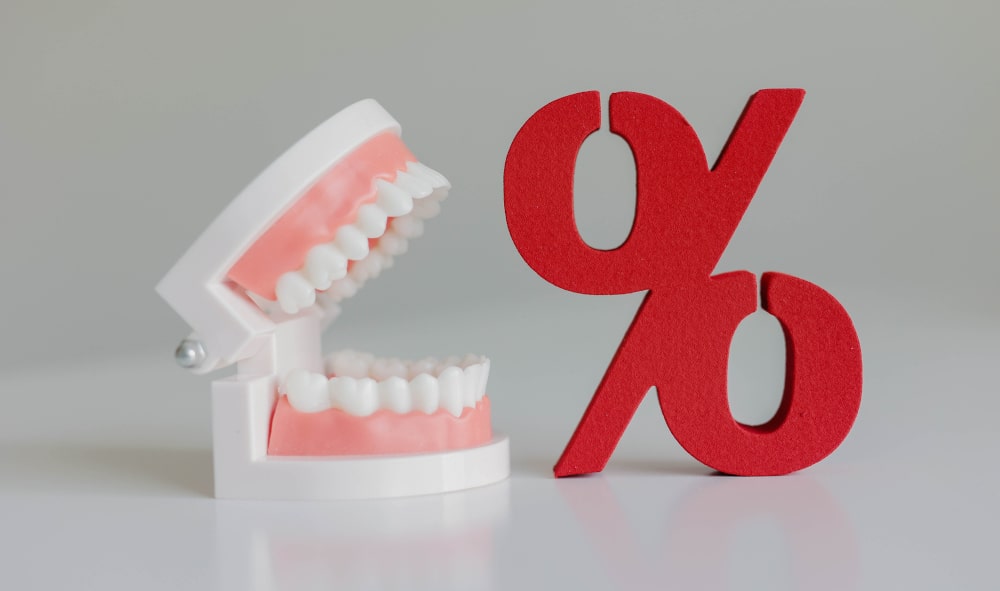
Alternatives to Dentures: From Partials to Implant-Supported Prostheses
Key Takeaways
- Alternatives to dentures include partial dentures, bridges, and implants, each with its unique pros and cons.
- Implants offer the best function and longevity, preserving bone and bite strength, but they are more expensive and require surgery.
- Partials are the most affordable option, while bridges offer a fixed mid-range alternative.
- Digital dentures and new materials are expected to improve comfort and fit in 2026.
- The right choice depends on budget, health, and lifestyle priorities.
What are the most common alternatives to dentures today?
When a patient hears the word "dentures," they often imagine a removable full arch. However, dentistry has evolved, and there are now multiple alternatives that cater to different needs. Let’s look at three of the most common ones.
Partial Dentures
Partial dentures are used when some natural teeth are still present. They are removable appliances anchored to existing teeth with clasps or precision attachments.
Pros:
- Affordable compared to implants or bridges.
- Non-invasive, often requiring no surgery.
- It can be adjusted or replaced relatively easily.
Cons:
- May feel bulky or unstable at times.
- Require daily removal and cleaning.
- Less natural appearance than fixed options.
Dental Bridges
A dental bridge replaces one or several missing teeth by attaching an artificial tooth (pontic) to neighbouring teeth.
Pros:
- Fixed solution — doesn’t move like a denture.
- Restores chewing ability effectively.
- Faster to complete than implants.
Cons:
- Requires reshaping healthy adjacent teeth.
- Risk of damage or decay under crowns over time.
- Limited lifespan compared to implants.

Implant-Supported Prostheses
Implants involve placing a titanium post into the jawbone, which supports a crown, bridge, or denture.
Pros:
- Most natural look and feel.
- Long-term durability, often lasting decades.
- Prevents bone loss in the jaw.
Cons:
- Higher upfront cost.
- Requires surgery and healing time.
- Not suitable for patients with certain medical conditions or those with insufficient bone density.

Expert input: Dr. James C.H. Ko DDS explains, “Many patients underestimate how much stability implants can add compared to traditional dentures. For those who qualify medically, implants often restore not just function but confidence.”
How do fake teeth options compare in comfort and durability?
Comfort and durability are the two factors patients ask about most often. While affordability is important, many people prioritize long-term peace of mind over short-term savings.
Comfort and Longevity Comparison Table
| Option | Comfort Level | Durability/Lifespan | Maintenance Needs | Cost Range (CAD) |
|---|---|---|---|---|
| Partial Dentures | Moderate, can feel bulky | 5–10 years with care | Daily removal/cleaning | $800–$2,500 |
| Dental Bridges | Good, fixed in place | 10–15 years on average | Regular check-ups | $2,500–$6,000 |
| Implant-Supported Prostheses | Excellent, feels natural | 20+ years (often lifetime) | Regular hygiene visits | $4,000+ per implant |
Key Considerations
- Partial dentures may cause sore spots, but are simple to replace.
- Bridges offer comfort but require alteration of healthy teeth.
- Implants mimic natural teeth in comfort and longevity, but cost and surgical eligibility are barriers.
Expert note: Dr. Amir Guorgui BSC, DMD, MACSD highlights, “From a durability standpoint, implants remain the gold standard. However, I often remind patients that consistent oral hygiene is what truly determines how long any option lasts.”
What is considered the top denture choice for patients in 2026?
Dental technology in 2026 looks very different from what it did a decade ago. Patients no longer face a simple choice between traditional dentures and nothing else. Innovations are shaping a new standard.
Digital Dentures
Digital dentures are created using CAD/CAM technology and 3D printing, offering:
- Exact fit
- Faster turnaround
- Enhanced comfort
According to recent clinical studies, digital dentures reduce the number of adjustment visits by nearly 40% compared to traditional methods.
Advanced Materials
New biocompatible resins and lighter alloys improve both comfort and aesthetics. These materials resist staining and wear, making them more durable than older acrylics.
Implant-Supported Overdentures
Hybrid solutions, such as implant-supported overdentures, are gaining popularity. They combine the removability of dentures with the stability of implants. Patients report higher satisfaction with both chewing function and social confidence.
How do alternatives to dental implants affect long-term oral health?
Tooth replacement is about more than filling a gap. Long-term oral health depends on how well a solution preserves gum health, bone integrity, and bite function.
Gum Health
Partial dentures and bridges rest partly on the gums. Over time, pressure can cause irritation or sore spots. Implants, by contrast, do not rest on soft tissue, preserving gum health more effectively.
Bone Structure
When teeth are missing, the jawbone gradually resorbs (shrinks). Bridges and dentures do not stop this process. Implants are unique in that they stimulate the jawbone, much like natural teeth, thereby maintaining bone density.
Bite Strength
Partial dentures and bridges restore chewing ability, but they rarely match the bite force of implants. Implants provide nearly full bite strength, allowing patients to eat a wider variety of foods without discomfort.

What role do partial dentures play compared to complete dentures?
Partial dentures serve a very different role from complete dentures. They are recommended when a patient still has several healthy teeth.
When Partial Dentures Are Recommended
- When several teeth are missing, but healthy teeth remain.
- As a transitional option before considering implants.
- For patients seeking an affordable solution without surgery.
Materials
Modern partial dentures can be made from:
- Acrylic resin – lightweight, economical.
- Metal frameworks – stronger, more durable.
- Flexible nylon – thinner, more comfortable.
Care and Maintenance (Step-by-Step)
- Remove and clean after meals with a denture brush.
- Soak overnight in a denture solution.
- Rinse thoroughly before reinserting.
- Schedule routine dental check-ups for adjustments.
Research note: The Canadian Dental Association emphasizes that partial dentures are most effective when combined with good oral hygiene to protect the remaining natural teeth (CDA resource).
How do the costs of fake teeth options compare?
Cost is a decisive factor for many patients. While prices vary by location and complexity, averages in Canada give a helpful benchmark.
Cost Comparison Table
| Option | Average Cost Range | Notes on Pricing Factors |
|---|---|---|
| Partial Dentures | $800 – $2,500 | Material choice, complexity of design |
| Full Dentures | $1,200 – $3,000 | Upper and lower sets cost more |
| Dental Bridges | $2,500 – $6,000 | Depends on the number of units and material |
| Implant-Supported Crown | $4,000 – $6,500 | Includes surgery, abutment, and crown |
| Implant-Supported Overdenture | $8,000 – $15,000 | Based on the number of implants and denture design |
Key Insights
- Dentures are the most affordable but require more frequent replacement.
- Bridges are mid-range in cost, but may compromise adjacent teeth.
- Implants have the highest upfront cost but can last for decades, making them cost-effective in the long term.

Are implant-supported prostheses the best alternative to dentures?
Implant-supported prostheses are often considered the most natural replacement for natural teeth. But are they truly the best?
Definition
An implant-supported prosthesis is a crown, bridge, or denture anchored by titanium implants surgically placed in the jawbone.
Benefits Over Traditional Dentures
- Prevent bone loss through jaw stimulation.
- Provide unmatched stability for chewing and speaking.
- Reduce or eliminate slipping and sore spots.
- Require less frequent replacement than dentures.
Comparison Table
| Factor | Traditional Dentures | Implant-Supported Prostheses |
|---|---|---|
| Stability | May slip or shift | Firmly anchored, stable |
| Bone Preservation | Bone resorption continues | Stimulates the jaw, prevents loss |
| Comfort | Can cause sore spots | Feels like natural teeth |
| Longevity | 5–10 years | 20+ years |
How do lifestyle factors influence the choice between dentures and alternatives?
Lifestyle is often the deciding factor when patients choose between dentures and alternatives.
Eating Habits
- Dentures may limit the consumption of harder or stickier foods.
- Implants restore near-natural bite force, allowing unrestricted diets.
Speech
- Dentures may affect pronunciation during adjustment.
- Implant-supported prostheses preserve natural speech clarity.
Aesthetics
- Bridges and implants offer the most natural look.
- Dentures can look natural, but stability issues may impact confidence.
Active Lifestyle
- Patients who exercise frequently or lead busy lives often prefer implants due to their stability and low maintenance requirements.
What are the psychological benefits of permanent tooth replacement?
Beyond its functional benefits, tooth replacement has a significant impact on emotional well-being.
Confidence
Patients with implant-supported prostheses often report smiling and speaking with more ease, free from concerns of slippage.
Quality of Life
Permanent replacements reduce the need for adhesives, adjustments, or dietary restrictions, leading to a more relaxed daily life.
Social Aspects
Many forum reviews emphasize the relief of not having to remove teeth at night or worry about dentures during social situations.
Which alternative to dentures or implants is best for you?
Choosing between dentures, bridges, and implants depends on individual health, lifestyle, and budget. Each option has unique strengths.
Summary Table
| Option | Best For | Key Advantages | Key Limitations |
|---|---|---|---|
| Partial Dentures | Patients are missing some teeth | Affordable, non-invasive | Less stable, requires daily care |
| Full Dentures | Patients missing all teeth | Economical, widely available | Bone loss continues, less comfort |
| Dental Bridges | Patients missing 1–3 teeth | Fixed, restores function quickly | Requires altering healthy teeth |
| Implant-Supported Prostheses | Patients seeking permanence | Long-term durability, best function | Higher upfront cost, surgery required |
Bibliography & References
- Canadian Dental Association: Implants and Dentures
- Canadian Dental Association: Dentures Overview
- Journal of Oral Rehabilitation, 2023: Review on bite strength and implant outcomes
- Journal of Prosthetic Dentistry, 2023: Studies on digital dentures

See what our patients are saying:
The Barrie Smile Centre is the best dental office I've ever been to. The staff is very friendly,professional and knowledgeable. They take away any anxiety and fear of going for a procedure. I highly recommend them!
Very clean, professional and friendly! They have done lots of work for me including 2 implants. I highly recommend them!
Very clean, professional and helpful. 2 other dentists previously tried to fix my composite veneer and both times it look awful and/or was the wrong colour. One trip here and everything was fixed!
Very friendly, helpful staff. Makes you feel welcome as soon as you enter. I needed a tooth removed and got in the same day I called. When I arrived I didn’t have to wait. I have numerous problem with my teeth and they came up with a solution. Thank you all so much.
Just got home from the Smile Centre and I'm thrilled with my results. Had Zoom whitening, and it was better than I expected. The attendant took the time to explain everything super thoroughly. She warned I may have sensitivity but so far so good. I wish I did it ages ago.
The first thing I noticed upon entering the building was the beautiful design plan and lovely staff. I was greeted at the door and made comfortable throughout my entire experience. Everything was explained to me in detail and the staff always made sure I fully understood. This is an amazing office and I would 10/10 recommend it!!
Amazing fast clean attentive friendly ! Im sold! Thankkk youuuuu guys !!!!!!! Had a wisdom.tooth taken out under sedation! All.went perfect and you guys were awesomee!
Every time I go to the Smile Centre in Barrie it’s an amazing experience! Everyone from the admin staff to the dentists are so helpful. Not only do they tell you your options (in my case options for a missing tooth), but they also explain the pros and cons of every option. I highly recommend the Smile Centre
Barrie Smile Centre is truly amazing I called and had an issue with with some tooth pain they were able to fit me in same day which I was truly grateful for. All the staff are kind and professional they truly care about there patients. Big thank you to Dr.Eisen for being so kind and helping me in this situation. I highly recommend Barrie Smile Centre 😃 Thanks again
Great family dentist, has always been on time for appointments. Doing a great job during these times with cleanliness as well! Very professional staff!

